Advanced Optimization of Lithium Battery ECM Parameters with CSA Over Varied Temperatures And C-Rates

Abstract: This paper discusses the novel parameter estimation approach by incorporating the Cuckoo Search Algorithm (CSA) to estimate the internal parameters of the battery occurring inside it due to chemical reactions. Several tests such as an open circuit voltage test and hybrid pulse power characterization test are conducted at variable C rates under three different temperature conditions to validate the approach. The Simulink model is developed to obtain the equivalent circuit model parameters. The objective function is taken as experimentally measured voltage and estimated voltage, the RMSE voltage error magnitude is found to be 0.28%.
Venue: Kharagpur, West Bengal.
Institute: IIT Kharagpur
Date: Dec 19 – 21, 2024
Solar-Powered VSI Speed Control of PMSM with Performance Analysis & Controller Optimization

Abstract: This study examines the integration of permanent magnet synchronous motors (PMSM) with renewable energy sources, focusing on solar photovoltaic (SPV) arrays to improve efficiency and sustainability in electric vehicle (EV) applications. PMSM, renowned for its high efficiency, silent operation, and precise control, is managed using a proportional-integral (PI) controller to handle variable load conditions, including fluctuations in torque and current. By fine-tuning the PI controller's gains, the desired motor speed is achieved efficiently. A DC-DC Buck-Boost converter serves as an intermediary power conditioning unit, optimizing energy extraction from the SPV array and enhancing system efficiency. This setup ensures that PMSM meets the power and operational demands of EVs. Additionally, a voltage source inverter (VSI) facilitates electronic commutation of the PMSM, providing accurate control using fundamental frequency pulses. The system is modeled and simulated in MATLAB/Simulink, demonstrating its reliability under diverse load conditions. The findings underscore the potential of this approach in promoting renewable energy integration in EVs, paving the way for cleaner and more sustainable transportation solutions.
Venue: NIT Raipur
Institute: NIT Raipur
Date: Jan 20 – 22, 2025
Bi-LSTM-based electrical load prediction model for a microgrid community area of Panama City

Abstract: Accurate prediction of electricity consumption is essential for the efficient functioning of power grids and the successful administration of energy markets in the field of energy planning. There are several benefits such as system efficiency, dependability, safety, and stability with the proper forecasting of load demand. To ensure the proper operation of the microgrid energy management system, it is essential to predict the overall load demand with precision and consistency. A bidirectional long short-term memory network (Bi-LSTM) model is considered in this paper for the electrical load forecasting of microgrids. The proposed model is verified by using the standard available load forecasting data set of Panama City. Furthermore, the approach is compared with LSTM load forecasting method. The various performance metrics such as MAE, RAE, RSE, R2, RMSE, and NRMSE are employed in this paper to evaluate the accuracy of the proposed prediction model... In this work, the Bi-LSTM method got the better error reduction values of 17.8% in MAE, 1.70% in RMSE, 2.37% in NRMSE, 3.5% in RSE, 19% in RAE and 1.2% improvement in R2 when compared to the LSTM model. The proposed load prediction model is helpful in estimating the future power shortages of the microgrid community which leads to improve the system efficiency and reliability.
Venue: Raipur
Institute: National Institute of Technology Raipur
Date: Jan 20 – 22, 2025
Customized Inverter configuration for multiple Pole-Pair Stator winding Induction motor drive with reduced DC Bus Voltage

Abstract: In this paper, A new customized multi-level inverter (MLI) configuration is proposed for induction motor drive, aiming to lower the requirement of DC bus voltage magnitude. This method utilizes pole pair winding coils separately to generate multi-level voltage waveform across the total stator phase windings. As the inverter requires lower input voltage it eliminates the requirement of boost converters when it is used in the EV applications. The inherent advantages of this topology significantly reduce control complexity in the battery systems by reducing the number of series-connected battery cells. The conventional Level-Shifted Sine Triangle PWM technique proficiently shifts low frequency harmonics to the carrier frequency, enhancing power quality and minimizing electromagnetic interference. Through MATLAB simulation, this new customized multi-level inverter-fed open-end stator winding Induction motor is simulated and results are presented to validate the proposed concept. Ultimately, our research aims to contribute to advancing electric vehicle technology by operating the induction motor with minimal input DC source voltage, and substantial output gain.
Venue: NIT Raipur, G.E Road, Amanaka, Raipur, Chhattisgarh, India
Institute: National Institute of Technology Raipur
Date: Jan 20 – 22, 2025
Non-isolated High-Gain DC-DC Converter with Moderate Gain for Hybrid Energy System Applications on DC Microgrids
Abstract: A novel non-isolated High-Gain DC-DC Converter with Moderate Gain for Hybrid Energy.
Venue: Online (SRM AP)
Institute: NIT Raipur
Date: Jan 20 – 22, 2025
Design and Analysis of DC-DC Boost Converter Using Model Predictive Controller
Abstract: A boost converter is a type of device used to convert direct current (DC) from one voltage level to another. It operates by increasing the input voltage to a higher output voltage level. DC-DC converters are utilised in a wide range of applications. The primary application of boost converters is to establish an interface with renewable energy sources. This paper presents a comparative analysis of two controllers, namely the Proportional Integral controller and Model Predictive Control (MPC), for practical applications of the Boost converter. The boost converter is designed and simulated in the MATLAB/SIMULINK environment for this study. The performance of the MPC con troller is found to be superior when compared to the PI controller. The effectiveness of the proposed control scheme is validated through the utilisation of OPAL-RT.
Venue: NIT Raipur
Institute: NIT Raipur
Date: Jan 20 – 22, 2025
Random Forest based Machine Learning Algorithm for Estimating State of Charge in Lithium-ion Batteries.
Abstract: This paper proposes a Random Forest (RF) machine learning algorithm-based
prediction model for the state of charge (SoC) level of lithium-ion batteries for electric vehicles. To show the effectiveness of the proposed prediction model performance, the RF model has been compared with the other machine learning algorithms such as Support Vector Machines (SVM) and Gradient Boosting (GB) approaches. The dataset includes cell temperature, state of charge (SoC), voltage, and current readings at three different external temperatures—15, 25, and 30 degrees Celsius are considered in this paper to test the performances of the proposed model. After preprocessing of the dataset, 20% of the data was used for testing and the remaining 80% for training purposes. The various metrics such as mean squared error (MSE), mean absolute error (MAE), coefficient of determination (R^2), root mean squared error (RMSE), normalized root mean squared error (NRMSE), residual standard error (RSE), and relative absolute error (RAE) are usually preferred to evaluate the performance of the prediction models. The simulation results of the proposed model clearly show the effectiveness of SoC-level estimation for real-time battery management systems (BMS) when compared to other machine learning algorithms. The efficiency of the proposed model is 99% and execution time is less than 5 seconds. The accurate estimation of the SOC of lithium-ion batteries is crucial for optimizing battery performance, ensuring safety, and extending battery life in electric vehicles.
Venue: Raipur
Institute: NIT Raipur
Date: Jan 20 – 22, 2025
Revamping the Method of Advanced V/f Control for Precision Speed Regulation in Three-Phase Induction Motors
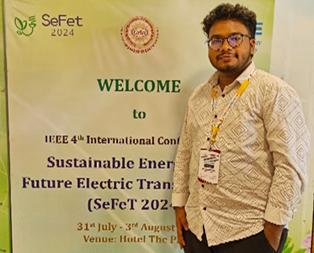
Abstract: The paper investigates the efficacy of V/f scalar control for a three-phase squirrel cage induction motor (IM) integrated with a proportional-integral (PI) controller and MOSFET-based inverter. The key objective is to achieve robust speed regulation and stability under varying load disturbances. In the present work, two control schemes have been delved (a) the closed-loop approach, offering superior performance but less common in industrial settings, and (b) the widely employed open-loop method. Leveraging MATLAB/Simulink, simulations have been performed to compare the performance of three-level and five-level inverter configurations. To quantify the harmonic content, a comprehensive analysis of total harmonic distortion (THD) has been conducted. The study further incorporates the concept of electric vehicles (EVs), exploring how the proposed control strategy could enhance the performance and efficiency of EV drives.
Venue: Hyderabad
Institute: Gokaraju Rangaraju Institute of Engineering & Technology, Hyderabad, Telangana
Date: July 31 – Aug 03, 2024
Real Time Implementation of Buck Converter using Optimized Type Compensators
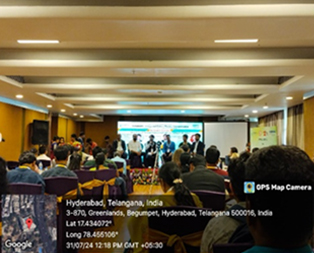
Abstract: This work investigates the application of Artificial Bee Colony (ABC) optimization for the design of Type compensators utilizing the dual-loop control scheme. The proposed Type compensators integrate the ABC optimization for regulating the closed-loop operation of a DC-DC buck converter. Such an integration of ABC optimization, aids in effectively regulating the output voltage and inductor current, besides ensuring enhanced time domain criteria. The proposed dual-loop control scheme consists of a current loop and a voltage loop. The current loop regulates the inductor current and the voltage loop regulates the output voltage.The efficacy of the proposed method is revealed through extensive simulation and experimental investigation under start-up response, step perturbations in external load. The experimentation is conducted on a laboratory prototype using dspace DS1104 control board.
Venue: Hotel Plaza, Begumpet, Hyderabad
Institute: Gokaraju Rangaraju Institute of Engineering & Technology
Date: July 31 – Aug 03, 2024
Independently controllable single-input dual-output DC-DC converter for DC microgrid based PV fed EV charging stations

Abstract: A new non-isolated single-input dual-output (NISIDO) DC-DC converter is proposed in this paper. The converter has the advantage of incorporating multiple outputs for energy storage applications, applicable in DC micro-grid storage systems, Electric vehicular charging stations, battery converters, and renewable energy systems without a filter capacitor. The significant advantage of the converter is it uses the interleaving technique to incorporate the outputs. The voltage stress across the switches and capacitor voltage stress is also reduced drastically. Thus it reduces the capacitor size when compared with the conventional boost converter. A closed-loop control strategy is implemented to control the load voltage as well as the inductor current. The converter is designed, analyzed, implemented, and tested using MATLAB SIMULINK software for 150W. The Simulation results are presented under various operating conditions such as changes in load with solar PV systems. The results from real-time testing are presented with the OPAL-RT system.
Venue: Hotel Plaza, Hyderabad
Institute: Gokaraju Rangaraju Institute of Engineering & Technology, Hyderabad
Date: Aug 03, 2024
A Novel Zero Voltage Switching Full Bridge Converter for Multiple Load Battery Fed LED Driver Applications
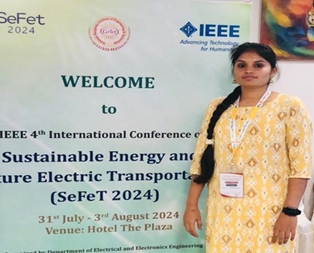
Abstract: A novel zero-voltage switching full-bridge (NZVSFB) converter designed for multiple load LED driver applications is introduced in this paper. Four LED lamps are involved in this configuration, with Lamp-2, Lamp-3, and Lamp-4 being powered by a full bridge converter, and Lamp-1 being directly connected in series with the battery source. The efficiency of the system is increased since the power provided to lamp-1 comes directly from a battery source, eliminating the need for any power processing stage. The major claims of the proposed NZVSFB converter are low component count/lamp, enhanced efficiency, zero voltage switching (ZVS) of all the switching devices, ripple free current and equal current sharing. The interleaved technique utilized in inductor design aims to mitigate the adverse effects of ripple currents on LED performance and circuit reliability by reducing their magnitude and ensuring more stable operation. The steady state operation of the proposed NZVSFB converter is discussed in detail and the effectiveness of the circuit is verified in MATLAB Simulink environment.
Venue: Hotel Plaza, Hyderabad
Institute: Gokaraju Rangaraju Institute of Engineering & Technology, Hyderabad
Date: Aug 03, 2024
Small Signal Modelling and Load Regulation Analysis of Capacitor Current Ripple Controlled Coupled Inductor SIDO Buck Converter
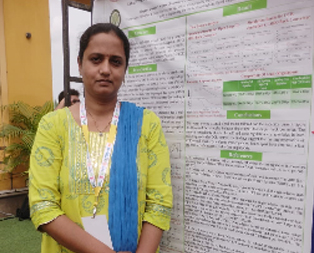
Abstract: As the capacitor current can respond to load fluctuations more rapidly than the peak inductor current, incorporating the capacitor current into the current control loop enhances the transient response in DC-DC converters as well as ensures over-current protection and noise immunity. This paper presents a comprehensive small-signal model (SSM) for a capacitor current ripple controlled (CCR) coupled inductor single-input dual-output (CI-SIDO) buck converter. The complete SSM is derived by unifying the developed SSM of the CCR controller with the SSM of the considered power converter using state-space averaging technique. In CCR control, the amalgamation of the comparator and SR flip-flop is accountable for producing the duty cycle. The proposed SSM is of immense usefulness in designing the outer loop controller, deriving switching instability conditions, and analysing the dynamic characteristics of the capacitor current controlled CI-SIDO buck converter. To evaluate the advantages of this current controller to CI-SIDO buck converter, a load regulation analysis using the SSM of CCR controller is provided and thereafter verified through simulations in MATLAB/Simulink. It is observed that the low frequency gain of the cross and self-regulation transfer functions is substantially less signifying promising dynamic and load disturbance rejection capability of the CCR control driven CI-SIDO buck converter.
Venue: The Plaza, Begumpet, Hyderabad
Institute: Gokaraju Rangaraju Institute of Engineering and Technology (GRIET)
Date: July 31 - Aug 03, 2024
Control Implementation of BKY Converter for EV Applications
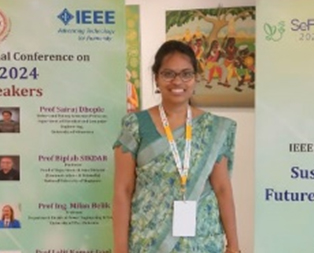
Abstract: This paper proposes BKY converter, which is made to run in continuous conduction mode during both the charging and discharging cycles for low power EV applications. An analysis is conducted on the converter's dynamic behaviour, and an approach to control is put forth to manage the power transfer between the traction system and battery in an electric vehicle. The suggested converter is designed using an extracted small-signal model. A significant ripple in the detected current causes switching instability in the current-mode control approaches at low duty ratios. The lowpass filter in the proposed average current mode control is positioned in the current loop's feedback to suppress any high-frequency ripples. A computation delay occurs when the controller is implemented in the microcontroller. The control algorithm's design takes this into account. A theoretical framework for current and voltage loop gain transfer functions are created using the realistic parameters of a BKY converter. Further, transient analysis is performed and validated by simulations.
Venue: Hotel Plaza, Begumpet, Hyderabad
Institute: Gokaraju Rangaraju College of Engineering and Technology
Date: July 31 - Aug 03, 2024

